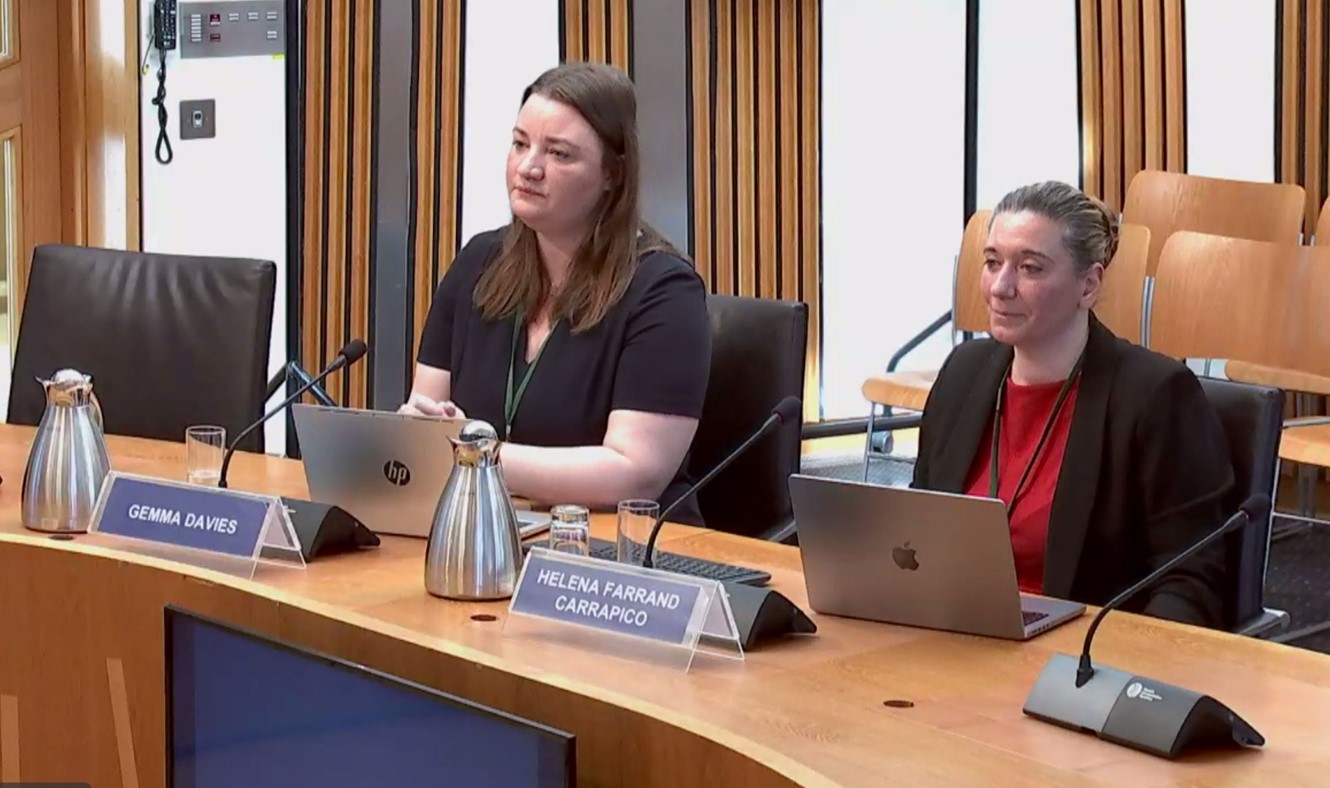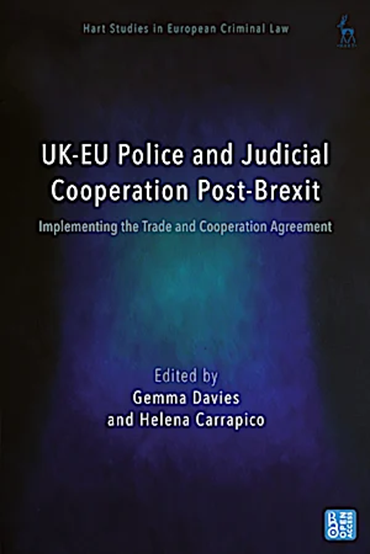Enhancing the UK’s International Cooperation in Criminal Matters Post Brexit
Primary participants
Gemma Davies, Associate Professor;
Professor Helena Farrand Carrapico
“This is a serious, thorough and most importantly useful piece of work which will help to set the terms of the debate for law reform in this area. The review has opened up discussion within and outside government and provides a strong rationale for pursuing law reform.” Penney Lewis, Criminal Law Commissioner of England and Wales.
“I acknowledge the valuable research Gemma Davies and Helena Ferrand Carrapico have undertaken on behalf of your Committee. The evidence you have collected will no doubt contribute to informed scrutiny of the UK Government’s approach to the forthcoming TCA review.” Andy Slaughter MP, Chair Justice Committee, House of Commons
“Your Report on UK-EU Law Enforcement and Judicial Cooperation in Criminal Matters under Part Three of the Trade and Cooperation Agreement, the Impact on Scotland, has provided us with an invaluable oversight into the state of the post-Brexit Scottish-EU criminal justice relationship…Your work has already highlighted several important areas where we need to focus on in terms of ensuring Scotland’s interests are fully engaged as part of the UK’s approach to the review of the Trade and Cooperation Agreement in 2026.” Audrey Nicoll MSP Convenor, Criminal Justice Committee, Scottish Parliament
Impact at a glance
- Strengthened the Scottish Government’s response to post-Brexit criminal justice challenges, ensuring that policymakers, government officials and the Scottish Parliament are better informed about gaps in police and judicial cooperation and equipped with practical recommendations to address them.
- Informed the UK Government’s preparations for the 2026 review of the Trade and Cooperation Agreement, influencing the UK government’s understanding of operational deficits in cross-border law enforcement and judicial collaboration with the EU and how they could be mitigated.
- Led a report recommending major reform to UK laws on extradition, jurisdiction and mutual legal assistance, aiming to shape the Law Commission’s future agenda and build cross-government support for modernising the UK’s legal framework for international cooperation in criminal matters. The report enabled Gemma and Professor Clare McGlynn to successfully advocate for new extra-territorial offences through the criminalisation of soliciting sexually explicit deepfakes from abroad, leading to tangible legislative change to better protect victims of image-based abuse.
Key Publications
- Davies and H. Farrand Carrapico (eds) ‘UK-EU Police and Judicial Cooperation Post Brexit’ (2025, Hart) https://www.bloomsburycollections.com/monograph?docid=b-9781509966479.
- Davies and H. Farrand Carrapico ‘Law Enforcement and Judicial Cooperation Post Brexit: The View from Scotland’ (October 2024) https://www.parliament.scot/chamber-and-committees/committees/current-and-previous-committees/session-6-criminal-justice-committee/business-items/research-on-impact-of-brexit-on-law-enforcement.
- Davies et al ‘International Cooperation and Extradition Scoping Review’ (June 2025, CLRNN) clrnn5-ice.pdf.

What was the problem?
When the UK left the European Union, it lost access to many vital tools and agreements that had enabled fast, effective police and judicial cooperation across borders. This sudden change created real risks that serious criminals could evade justice and that victims’ rights could go unprotected, with gaps in extradition, information sharing, and mutual legal assistance making law enforcement more challenging.
- Loss of vital EU cooperation tools: Brexit removed the UK’s access to fast and reliable EU systems for police and judicial cooperation, creating legal and operational gaps in areas like extradition, evidence sharing and cross-border investigations.
- Increased risks for tackling serious and organised crime: Without clear frameworks, criminals could exploit cross-border loopholes, making it harder for law enforcement agencies to pursue offenders and protect victims’ rights.
- Outdated UK legal frameworks for international justice: Existing UK laws on extradition, mutual legal assistance and jurisdiction were not designed for this new context, highlighting the urgent need for modern, joined-up legal solutions to keep people safe.
Gemma’s research addresses these pressing problems by analysing how Brexit has impacted cross-border crime and justice, identifying where the UK’s current legal frameworks fall short, and providing practical, evidence-based recommendations to help governments, parliaments and agencies close those gaps and strengthen international cooperation.
News reporting on the issue
By Joshua Rozenburg
By Law Society Gazette
By Durham University

How did these changes come about?
- Gemma and Helena were commissioned by the Criminal Justice Committee of the Scottish parliament to conduct interviews with a wide range of stakeholders revealing how the loss of EU police and judicial cooperation tools after Brexit has affected the UK’s ability to combat serious crime. They worked closely with criminal justice agencies, policymakers and legal experts to map where current laws and procedures were falling short, especially in areas like extradition, mutual legal assistance and cross-border prosecutions.
- Beyond research, Gemma and Helena actively engaged with governments and parliaments in the UK, Scotland, Ireland and the EU to share their findings and provide practical, evidence-based recommendations for reform. Through reports for bodies such as the Independent Commission on UK-EU Relations, parliamentary briefings and written and oral evidence, roundtables and high-level policy events, their work is directly informing parliamentary oversight, government policy, shaping law reform proposals and helping ensure that people and communities remain protected in a changing legal landscape.

Image: Gemma and Helena giving evidence to the Criminal Justice Committee

What has happened since?
Parliamentary Engagement & Expert Evidence on post Brexit cooperation
- In early 2025, Gemma provided expert evidence orally to the Scottish Parliament’s Criminal Justice Committee and in late 2024 to the UK Parliament’s Foreign Affairs Committee in writing, highlighting the practical challenges arising from Brexit and how the Trade and Cooperation Agreement (TCA) implementation affected day-to-day policing and judicial cooperation. The Convenor of the Criminal Justice Committee subsequently wrote to the Chief Constable of Police Scotland, the Chair of the UK Home Affairs Committee, the Lord Chancellor, the Secretary of State for Justice, the Secretary of State for the Home Department, the Cabinet Secretary for Justice and Home Affairs and the Lord Advocate highlighting their research and the key recommendations made. The Lord Advocate confirmed that a paper outlining the Scottish Government’s priorities for UK-EU cooperation was subsequently shared with the UK Government.
- Gemma and Helena have co-edited an open-access volume titled UK–EU Police and Judicial Cooperation Post‑Brexit, published in July 2025, which gathers practitioner and academic insights into how the TCA is working and how it can be improved.
Enhanced UK–Ireland Cooperation in the lead up to Brexit
- Gemma played a central role in forming and leading the UK‑Irish Criminal Justice Cooperation Network, funded by the AHRC which brought together police, judicial, and other criminal justice agencies from both jurisdictions. Through this Network’s series of workshops (2018–2020), her research informed high-level policy briefings and shaped contingency planning—ensuring that in the lead up to the UK leaving the EU, UK law enforcement agencies had practical, evidence-based input on how to continue collaboration even in the event of a no-deal Brexit.
- Gemma’s contributions were referenced throughout official reports on the emerging UK–Ireland security partnership. For example, an April 2020 report titled Cross-border co-operation on policing, security and criminal justice after Brexit cited her work 62 times.
- Gemma’s research is now firmly shaping policy frameworks, being picked up by parliamentary committees, influencing cross-border cooperation strategies, and forming part of an emerging academic-policy narrative about reforming cross border cooperation in a post-Brexit world.

What next?
- There will be a launch of the book ‘UK-EU Police and Judicial Cooperation Post Brexit: Implementing the Trade and Cooperation Agreement’ in September 2025. Gemma and Helena will be continuing to work with stakeholders as the UK and EU move to review of the TCA in 2026.
- The Law Commission of England and Wales is currently reviewing the report Gemma led on the need for reform of the UK’s legal framework for international cooperation—covering extradition, mutual legal assistance, and jurisdiction. This is the first step toward comprehensive reform. The report will be officially launched in Parliament in September 2025.
- Further academic work in collaboration with the report’s co-authors is planned for 2025 and 2026. Gemma is editing a symposium of the Transnational Criminal Law Review which will be published in early 2026 and from September 2025 she will be working with Dr Estelle Baker who secured funds from the British Academy for a project titled ‘Cross-Border Criminal Evidence Transfer in the 21st Century – An Irish Case Study’.

Image: Gemma’s and Helana’s book on UK-EU Police and Judicial Cooperation Post-Brexit, which is due for release in July 2025.

Videos
Criminal Justice Committee - 30 April 2025
Watch Gemma give evidence to The Scottish Criminal Justice Committee on her research into the impact of the UK’s exit from membership of the EU on law enforcement and judicial cooperation in Scotland.
Find out more
By Anthony Hanratty
Read Anthony Hanratty’s article for Howard Kennedy on whether extradition law reform is on the horizon.
By Rebecca Niblock
Read Rebecca Niblock’s article for The Solicitor’s Journal on modernising cross-border criminal justice.
By Ben Keith
Read Ben Keith’s piece for 5 St Andrew’s Hill on the publication of Gemma’s Scoping Review.
By My Science
Read the My Science write up of Gemma’s Scoping Review and the call for urgent reform in the international battle against crime.
By Professor Rob Currie
Read Professor Rob Currie’s write up of Gemma’s Scoping Review which calls for Canada to consider the report and undertake its own reform project.
By Gemma Davies and Paul Arnell
Read Gemma and Paul Arnell’s article for The Conversation on Julian Assange: how British extradition law works.


/prod01/prodbucket01/media/durham-university/departments-/law-school/37038.jpg)
/prod01/prodbucket01/media/durham-university/departments-/law-school/Picture2.png)

/prod01/prodbucket01/media/durham-university/departments-/law-school/Substack-Logo.jpg)
/prod01/prodbucket01/media/durham-university/departments-/law-school/Screenshot-2025-07-18-154252.png)
/prod01/prodbucket01/media/durham-university/campaign-sites/universities-for-north-east-england/Durham-University-Logo.jpg)

/prod01/prodbucket01/media/durham-university/departments-/law-school/howardkennedy.png)
/prod01/prodbucket01/media/durham-university/departments-/law-school/Solicitors-Journal-Logo.jpg)


/prod01/prodbucket01/media/durham-university/departments-/law-school/logo-og.png)
/prod01/prodbucket01/media/durham-university/departments-/law-school/myscience-logo-png_seeklogo-412757.png)


/prod01/prodbucket01/media/durham-university/departments-/law-school/41jfV2sqw4L-325X289.jpg)
/prod01/prodbucket01/media/durham-university/departments-/law-school/New-Coversation-Logo.jpg)

